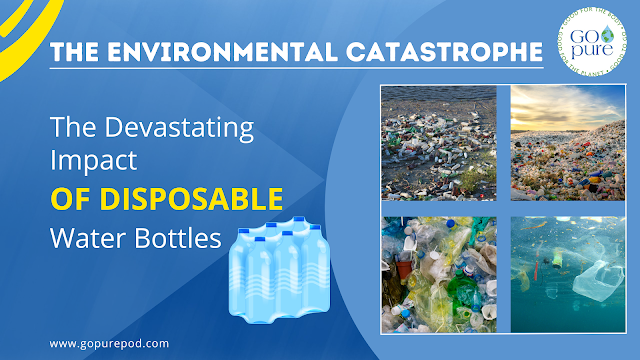Ceramic Water Filter: All You Need to Know
Clean water is an essential part of our daily lives, but many a time, you may not have easy access to pure and fresh water. That's where ceramic water filters come in. In recent years, ceramic water filters have become popular, and they're now used in households all over the world to purify drinking water. A ceramic water filter is a type of water filtration device that uses a ceramic filter to remove impurities from water. The ceramic material serves as a physical barrier, trapping contaminants such as bacteria, sediment, and heavy metals while allowing clean water to pass through. Ceramic filters are praised for their durability and effective filtration capabilities.
This article will discuss portable ceramic water filters, how they work, and what impurities they remove. We'll also cover the pros and cons of these filters and help you understand what to look for when choosing a personal water filter.
How do Ceramic Water Filters work?
Ceramic water filters work by using a process called physical filtration. The ceramic element acts as a
sieve, trapping impurities as the water passes through it. The ceramic element is typically housed in a container. As the water passes through it, impurities get trapped, thus dispensing clean water. Ceramic water filters are the best water filters as they work the way our Earth naturally purifies water, water seeps in through the layers of rock and soil in the ground and gets filtered as it goes along.
What Does a Ceramic Water Filter Remove?
Ceramic water filters are designed to remove a variety of contaminants from water, including bacteria, viruses, and sediment. In addition to these contaminants, ceramic water filters can also remove other impurities, such as chlorine, heavy metals, and organic chemicals.
Some of the most common impurities that ceramic water filters remove include:
- Bacteria: Ceramic water filters remove bacteria from water, making it safe to drink.
- Viruses: These filters also provide an additional layer of protection against viruses and waterborne illnesses.
- Sediment: it helps eliminate sediments, including dirt, sand, and other particles, from water, making it clearer and more refreshing.
- Chlorine: ceramic water filters can remove chlorine from water, reducing the risk of ingesting this chemical and its by-products.
- Heavy metals and organic chemicals: ceramic helps filter heavy metals such as lead and arsenic while removing organic chemicals like pesticides and herbicides. Thus, reducing the risk of exposure to these potentially harmful substances.
- Unpleasant Odor and Taste: Even if you receive a clean tap water supply at your home, ceramic filters can help refine the taste and odor of your existing water. With the help of ceramic water filters, you can enjoy the tasty and refreshing water.
Pros of Ceramic Water Filter
- Effective filtration: Ceramic filters are capable of removing a wide range of impurities from water, including bacteria, parasites, and suspended particles.
- Cost-effective: these are relatively inexpensive and long-lasting, making them a cost-effective solution for households that require safe drinking water.
- Environmentally friendly: ceramic water filters do not generate waste and do not require energy to operate, making them an environmentally responsible choice.
- Portability: portability is the USP of ceramic water filters, making them ideal for people who travel or need to purify water in remote locations. GOpure Pod is one such water purifier on the go.
- Easy to use: considerably easy to use, requiring only a simple set-up and regular maintenance to keep them effective.
Cons of Ceramic Water Filter
- Can clog: Ceramic water filters can become clogged with impurities over time, reducing their effectiveness and requiring more frequent cleaning.
- Not effective against all contaminants: While ceramic water filters are effective at removing many contaminants from water, they are not effective against all types of contaminants.
- Slow flow rate: Ceramic water filters have a slow flow rate, making it difficult to match the needs.
How Should You Pick a Ceramic Water Filter?
When choosing a ceramic water filter, there are several factors to consider, including:
Size: Ceramic water filters come in a range of sizes, from small personal water filters to larger filters for families or groups. Consider the size you need based on the number of people using the filter and the amount of water you wish to purify.
Flow rate: The flow rate of a ceramic water filter refers to the speed at which water passes through the filter. Consider your needs and choose a filter with a flow rate that meets your needs.
Portability: Some ceramic water filters are more portable than others. Consider your requirement and choose the best water filter that is easy to carry and can be used in different ways.
Price: Ceramic water filters vary in price, and some can be more expensive than others. Consider your budget and choose a filter that meets your water needs and fits within your budget.
Conclusion
When choosing a ceramic filter, consider your specific requirements and choose a filter that aligns with the same. Coupling ceramic water filters with different kinds of filters that remove chemicals give you access to fresh and potable water wherever you go.
One of the ceramic water filter brands that you might consider is the GOpure Pod. The GOpure Pod is a portable water filter pod that removes contaminants from water, making it safe to drink. The Pod is easy to use, simply drop it into a bottle of water and begin sipping. The GOpure Pod is an affordable and effective way to purify water on the go.




Comments
Post a Comment